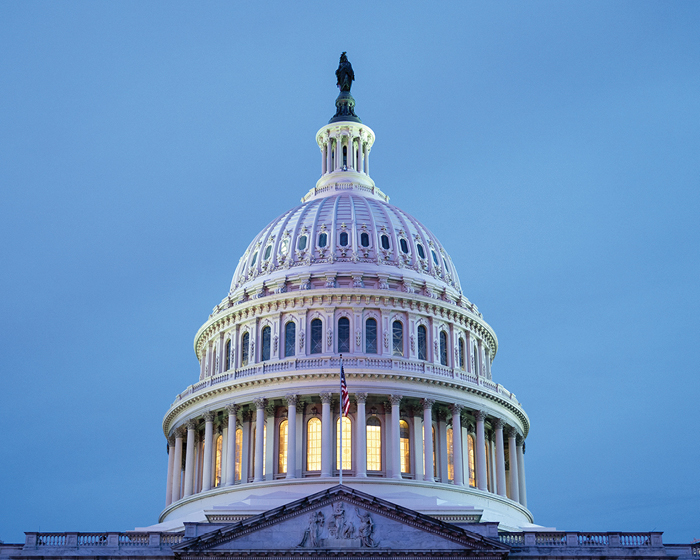Key Takeaways
- Congress faces a Sept. 30 to keep the government running.
- Enhanced premium tax credits for insurance exchanges are emerging as a potential way to bridge the partisan divide.
- Republicans are divided on whether or not to change the credits' expiration on Dec. 31.
- Dems want automatic gratuities to be eligible for the OBBBA's tips exemption.
- Lawmakers concerned about instability in IRS leadership.
There’s already been one tense showdown this year over government funding, and Washington is bracing for another one that could go down to the last minute—if they’re lucky.
Funding for the federal government is set to expire on Sept. 30, just three weeks away. Both parties are prepared for a tough fight, following the backlash that Democratic leaders saw when they agreed not to block a funding measure in March. It’s looking like a major tax issue could become a bargaining chip as negotiators desperately look for common ground.
Democrats are pushing for any funding deal to include a measure extending the enhanced premium tax credits for the health care exchanges established under the Affordable Care Act. These are credits to offset the purchase of insurance, available to lower-income individuals who do not qualify for Medicaid or Medicare. In the original law, the credits were limited to those whose earnings were less than 400% of the federal poverty level. But the 2021 American Rescue Plan temporarily increased the amount of insurance that the credit would cover and expanded its eligibility to include those above the 400% level. The Inflation Reduction Act extended the benefit until the end of 2025. The enhancement contributed to a surge of new enrollees in the exchanges, and according to the Congressional Budget Office, if the benefit expires it could lead to a spike in premiums if those enrollees leave.
Republicans haven’t been eager to change the expiration date—they hadn’t supported any of the legislation that created, enhanced or extended the credit. They also have noted that this was originally meant to be a relief measure during the Covid pandemic, not a permanent benefit, and that some of it goes to those who can afford insurance on their own. And they note the price tag for an extension—$383 billion over 10 years, according to the Joint Committee on Taxation.
Democrats, however, are pushing hard to include the credits in a bipartisan spending package, with some describing it as a “red line.”
The potential standoff highlights the partisan divide over the issue, but also reveals some divisions within the Republican party as well. While many deficit hardliners are strongly opposed to extending the credit, others are open to some kind of compromise. According to reports, a recent meeting of Republican members of the Ways and Means Committee highlighted strong, vocal disagreements within the caucus on the issue.
This recalls the height of the negotiations over the One Big Beautiful Bill, when some Republicans fought against savings through Medicaid changes, claiming it contradicted the party’s populist nature under President Trump. They ultimately lost that fight, but the underlying dynamics remain.
If the issue isn’t addressed in a government funding measure, it could be taken up again in year-end tax legislation, whether it’s bipartisan or part of another reconciliation package.
There are likely to be plenty of twists and turns as the parties look towards resolution on government funding. But one way or another, the Obamacare credits will likely be a key issue along the path.
Recent Tax Pieces:
The Tax Angle: New Extenders, Housing Credits – Stephen K. Cooper, Law360 Tax Authority ($):
Under the budget reconciliation law, a newly enacted $40,000 cap on state and local tax deductions lasts from 2025 to 2029 and phases out for taxpayers with incomes of $250,000 for individuals and $500,000 for married filers, before eventually returning to a $10,000 cap starting in 2030.
Dems say OBBB left home energy credit intact – Laura Weiss, Punchbowl News ($):
Rep. Steven Horsford (D-Nev.) is leading a letter with Ranking Member Richie Neal (D-Mass.) and other committee Democrats to Treasury Secretary and acting IRS Commissioner Scott Bessent. It calls on the IRS to “affirm publicly” that the benefit is still available through 2032.
Dem Renews Push for Auto-Gratuities to Qualify for Tip Deduction – Katie Lobosco, Tax Notes ($):
It’s unclear whether tips automatically added to a bill would qualify. But some tax watchers have said the law likely excludes those tips because they weren’t paid voluntarily.
“Mandatory service charges” or “minimum additional charges for large parties” probably won’t qualify, E. Jason Tremblay of Saul Ewing LLP said during a September 10 webinar.
Tax Writers Seek Stable IRS Leadership – Zach C. Cohen, Bloomberg Tax ($):
Senators are now waiting for President Donald Trump to name Long’s successor to steady the ship ahead of filing season.
“We need somebody, and a little stability there,” said Sen. John Cornyn (R-Texas), a senior member of the tax-writing Senate Finance Committee. “I’m anxious to hear who the president wants to nominate.”
Opinion: The Tax Break on Car Loans Is a Sideshow – Liam Denning, Bloomberg Tax ($):
Make a habit of sustained success.



